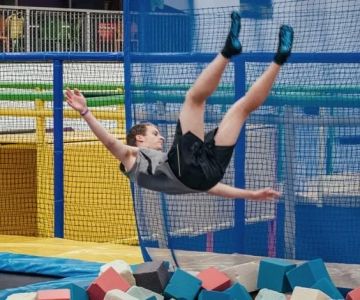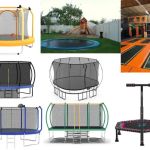- 1-Benefits-of-Trampoline-Obstacle-Courses
- 2-Planning-Your-Trampoline-Obstacle-Course
- 3-Creative-Obstacle-Ideas-for-Trampoline-Courses
- 4-Safety-Tips-While-Creating-and-Using-the-Course
- 5-Real-Life-Examples-and-User-Experiences
1. Benefits of Trampoline Obstacle Courses
Creating a trampoline obstacle course is a fantastic way to add excitement and challenge to traditional trampoline use. These courses promote physical fitness, coordination, and creativity, making bouncing more engaging for kids and adults alike.
Obstacle courses on trampolines can improve balance, agility, and endurance, all while providing a safe environment for active play. The dynamic nature of these courses encourages healthy competition and social interaction.
1.1 Physical and Mental Advantages
Regular use of trampoline obstacle courses helps develop muscle strength and cardiovascular health, alongside problem-solving skills as participants navigate different challenges.
2. Planning Your Trampoline Obstacle Course
Before building your trampoline obstacle course, careful planning ensures both fun and safety.
2.1 Assess Available Space and Equipment
Consider the size of your trampoline and surrounding area. Some obstacle elements may require extra space, so measure accordingly.
2.2 Define the Difficulty Level
Tailor the course complexity based on the users’ ages and skill levels, keeping younger children’s capabilities in mind.
3. Creative Obstacle Ideas for Trampoline Courses
Incorporate a variety of fun obstacles that challenge different skills and keep participants motivated.
3.1 Jump Rings and Hoops
Set up rings or hoops on stands to jump through, improving timing and precision.
3.2 Balance Pads and Soft Blocks
Add soft pads to walk or bounce across, enhancing balance and foot coordination.
3.3 Climbing and Crawling Tunnels
Introduce lightweight tunnels or crawl spaces on or beside the trampoline to encourage full-body movement.
3.4 Timed Challenges
Use timers or stopwatches to turn the course into a competitive race, motivating users to improve their speed and technique.
4. Safety Tips While Creating and Using the Course
Safety is paramount when building and using trampoline obstacle courses.
4.1 Use Padded and Non-Slip Materials
Ensure all obstacles and trampoline surfaces are cushioned and slip-resistant to minimize injury risks.
4.2 Supervise and Set Rules
Always supervise users, especially children, and establish clear rules such as one jumper at a time and no risky stunts.
4.3 Regular Equipment Checks
Inspect obstacles and trampoline parts frequently for wear or damage and replace anything compromised.
5. Real-Life Examples and User Experiences
Many families and trampoline enthusiasts have created personalized obstacle courses with great success.
5.1 A Family’s Creative Course
One family combined homemade balance beams and jump targets to keep their kids active during the winter months. Their kids’ coordination and confidence noticeably improved over time.
5.2 Community Events and Friendly Competitions
Local trampoline parks often host obstacle course challenges, inspiring users to test skills and enjoy social play in a safe setting.
For those interested in building or upgrading their trampoline with obstacle course accessories, Trampoline Zone offers a variety of products and expert advice to help you design the perfect setup. With careful planning and creativity, you can transform your trampoline into a dynamic playground that’s fun, safe, and rewarding for everyone.







 Pump It Up Lake Forest Kids Birthday and More4.0 (280 reviews)
Pump It Up Lake Forest Kids Birthday and More4.0 (280 reviews) Urban Air Trampoline and Adventure Park4.0 (349 reviews)
Urban Air Trampoline and Adventure Park4.0 (349 reviews) Church Street Plaza4.0 (731 reviews)
Church Street Plaza4.0 (731 reviews) Fun City Adventure Park3.0 (162 reviews)
Fun City Adventure Park3.0 (162 reviews) Riki Tiki's Indoor PlayGround4.0 (35 reviews)
Riki Tiki's Indoor PlayGround4.0 (35 reviews) Urban Youth Park - South Bay4.0 (107 reviews)
Urban Youth Park - South Bay4.0 (107 reviews) Are Trampoline Parks Safe for Kids? Essential Guide for U.S. Parents
Are Trampoline Parks Safe for Kids? Essential Guide for U.S. Parents How Often Should You Replace Trampoline Springs? Tips for Proper Maintenance
How Often Should You Replace Trampoline Springs? Tips for Proper Maintenance How Much Is a Trampoline? A Detailed Guide to Trampoline Costs and Buying Tips
How Much Is a Trampoline? A Detailed Guide to Trampoline Costs and Buying Tips Bounce Techniques for Stronger Legs: Effective Exercises and Tips
Bounce Techniques for Stronger Legs: Effective Exercises and Tips Essential Music Gear for Trampoline Dance: Complete Guide
Essential Music Gear for Trampoline Dance: Complete Guide Fun STEM Experiments Using Trampolines to Spark Curiosity and Learning
Fun STEM Experiments Using Trampolines to Spark Curiosity and Learning